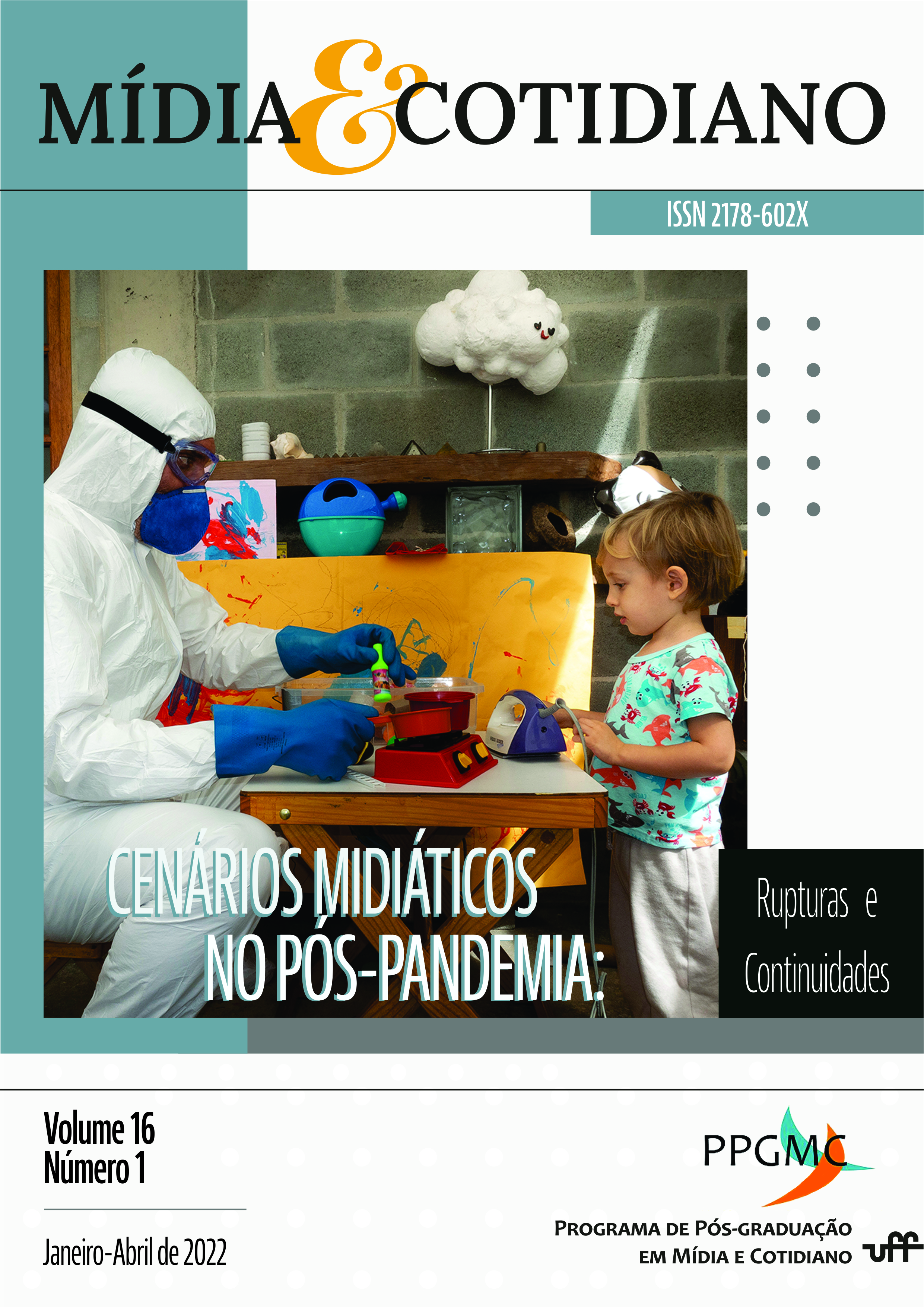Media, Alienation and Extension: innocence in the use of new media
DOI:
https://doi.org/10.22409/rmc.v16i1.51680Keywords:
Media, Alienation, ExtensionAbstract
Paradoxically, the means are seen as elements that generate both emancipation and alienation. The critique of alienation is commonly observed in the Frankfurt School discourse, while the vision of emancipation is in the Theory of Means. Analyzing this issue dialectically, we intend to confront the functionalist view of McLuhan's Theory of Means, with the critical view of Adorno and Horkheimer's Frankfurt School, in order to seek a synthesis that demonstrates how the two ideas validate, and that the means they produce both alienation and emancipation. To develop this question, it will be observed how at the beginning of any media revolution, the innocence of users usually facilitates the emergence of political figures with fundamentalist discourses: it was like that with the mass media and Nazism, it has been like that with the media digital.
Downloads
References
AGAMBEN, Giorgio. Signatura rerum. São Paulo: Boitempo, 2019.
ADORNO, T. e HORKHEIMER, M. Dialética do Esclarecimento. Rio de Janeiro: Zahar, 2019.
ADORNO, T. e HORKHEIMER, M. Indústria Cultural: O Iluminismo como mistificação das Massas. (in) LIMA, L. C. Teorias da Cultura de Massa. São Paulo: Paz & Terra, 2000.
ARENDT, H. Algumas Questões de Filosofia Moral. In: Arendt, H. Responsabilidade e julgamento. São Paulo: Companhia das Letras, 2004.
BAITELLO, N. (A massa sem corpo), (o corpo sem massa), (a massa sem massa), (o corpo sem corpo. As redes sociais como ambientes de ausência (e fundamentalismos). (in). LOPES, M. I. V. de, e, KUNSCH, Margarida Maria Krohling (org.). Comunicação, cultura e mídias sociais. São Paulo: ECA-USP, 2015.
BARTHES, R. Mitologias. Rio de Janeiro: Bertrand. 1999.
BAUMAN, Z. Retrotopia. Rio de Janeiro: Zahar, 2017.
CÁDIMA, R. A rede na estratégia da aranha: “pós-verdade”, política e regressão. Observatorio. 2018. Disponível em: http://obs.obercom.pt/index.php/obs/article/view/1294.
CARVALHO, D. Tem alguns idiotas que até hoje ficam em casa, diz Bolsonaro sobre isolamento na pandemia. Folha de São Paulo.17.mai.2021 às 10h51Atualizado: 17.mai.2021 às 11h33. Disponível em: https://www1.folha.uol.com.br/poder/2021/05/tem-alguns-idiotas-que-ate-hoje-ficam-em-casa-diz-bolsonaro-sobre-isolamento-na-pandemia.shtml
D'ANCONA, M. Fake News: A nova guerra contra os fatos em tempos de fake News. São Paulo: Faro Editorial, 2018.
DUGNANI, P. Globalização e desglobalização: outro dilema da Pós-Modernidade. Revista Famecos, Porto Alegre, v. 25, n. 2, p. 1-14, maio, junho, julho e agosto de 2018: ID27918. DOI: http://dx.doi.org/10.15448/1980-3729.2018.2.27918.
FOUCAULT, M. As Palavras e as Coisas. São Paulo: Martins Fontes, 1990.
GAZETA. 434 mil mortes "Alguns idiotas até hoje ficam em casa", diz Bolsonaro sobre isolamento. (17/05/2021). DISPONÍVEL EM: https://www.agazeta.com.br/brasil/alguns-idiotas-ate-hoje-ficam-em-casa-diz-bolsonaro-sobre-isolamento-0521.
MATTELART, A. e MATTELART M. História das Teorias da Comunicação. São Paulo: Loyola, 1999.
MCLUHAN, M. Os Meios de Comunicação como Extensões do Homem. Cultrix: São Paulo, 2016.
MIRANDA, C. A. C. A arte de curar nos tempos da colônia: limites e espaços da cura. Recife : Ed. Universitária da UFPE, 2017.
MURDOCK, G. Refeudalização revisitada: a destruição da democracia deliberativa. Matrizes, São Paulo, V.12 – Nº 2 maio/ago, p. 13-31. 2018. Disponível em: http://www.revistas.usp.br/matrizes/issue/view/10795. Acesso em: 14/09/2018.
PRIOR, H. Mentira e política na era da pós-verdade: fake news, desinformação e factos alternativos. (2019). In P. Lopes & B. Reis (eds.), Comunicação Digital: media, práticas e consumos (pp. 75-97). Lisboa: NIP-C@M & UAL. Disponível em http://hdl.handle.net/11144/3976. https://doi. org/10.26619/978-989-8191-87-8.4. Acesso em janeiro de 2021.
REGO, A. R. Vigilância, controle e atenção: a desinformação como estratégia. Organicom – ano 17 • número 34 • setembro / dezembro 2020. Disponível em: https://www.researchgate.net/publication/349987911_Vigilancia_controle_e_atencao_a_desinformacao_como_estrategia.
ROSA. H. Aceleração A transformação das estruturas temporais na Modernidade. São Paulo: Unesp, 2019.
Downloads
Published
Versions
- 2022-01-27 (2)
- 2022-01-19 (1)
How to Cite
Issue
Section
License
Aviso de Direito Autoral Creative Commons
1. Política para Periódicos de Acesso Livre
Autores que publicam nesta revista concordam com os seguintes termos:- Autores mantém os direitos autorais e concedem à revista o direito de primeira publicação, com o trabalho simultaneamente licenciado sob a Licença Creative Commons Attribution que permite o compartilhamento do trabalho com reconhecimento da autoria e publicação inicial nesta revista.
- Autores têm autorização para assumir contratos adicionais separadamente, para distribuição não-exclusiva da versão do trabalho publicada nesta revista (ex.: publicar em repositório institucional ou como capítulo de livro), com reconhecimento de autoria e publicação inicial nesta revista.
- Autores têm permissão e são estimulados a publicar e distribuir seu trabalho online (ex.: em repositórios institucionais ou na sua página pessoal) a qualquer ponto antes ou durante o processo editorial, já que isso pode gerar alterações produtivas, bem como aumentar o impacto e a citação do trabalho publicado (Veja O Efeito do Acesso Livre).


